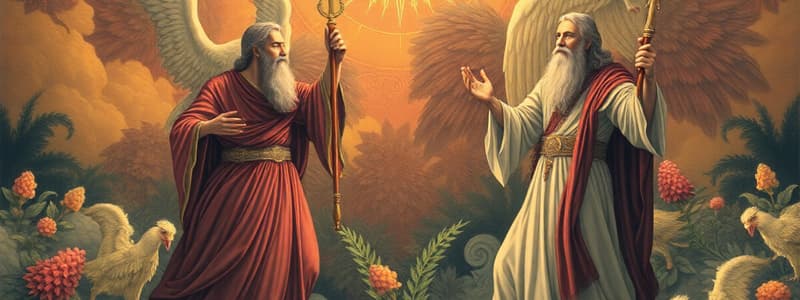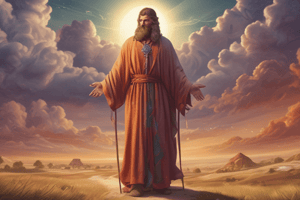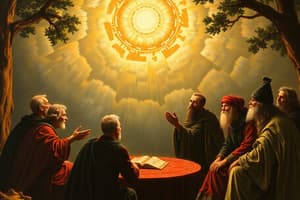Podcast
Questions and Answers
What is one indicator that a prophet is false?
What is one indicator that a prophet is false?
- Speaking in the name of Yahweh
- Practicing divination or sorcery (correct)
- Being concerned for social welfare
- Performance of miracles
True prophets may prophesy in the name of any god other than Yahweh.
True prophets may prophesy in the name of any god other than Yahweh.
False (B)
List one characteristic that distinguishes true prophets from false prophets.
List one characteristic that distinguishes true prophets from false prophets.
High moral quality or concern for social welfare.
If a prophecy is not ______, the prophet is considered false.
If a prophecy is not ______, the prophet is considered false.
Match the following characteristics with the type of prophet:
Match the following characteristics with the type of prophet:
Which of the following is NOT a biblical test for identifying false prophets?
Which of the following is NOT a biblical test for identifying false prophets?
True prophets are often criticized for social injustices.
True prophets are often criticized for social injustices.
What type of experience is essential for a true prophet?
What type of experience is essential for a true prophet?
What is a key element of the new era in the progress of redemption according to the prophets?
What is a key element of the new era in the progress of redemption according to the prophets?
The eschatological prophetic message is focused on the individual experience rather than the community.
The eschatological prophetic message is focused on the individual experience rather than the community.
Who is seated at the right hand of the Father, confirming the hope of the future?
Who is seated at the right hand of the Father, confirming the hope of the future?
The coming of Jesus shows more clearly the __________ dimension of the kingdom.
The coming of Jesus shows more clearly the __________ dimension of the kingdom.
Match the following elements of prophetic hope with their descriptions:
Match the following elements of prophetic hope with their descriptions:
What was a key characteristic of false prophets according to the content?
What was a key characteristic of false prophets according to the content?
True prophets often provided messages that were popular and comforting.
True prophets often provided messages that were popular and comforting.
What did Jeremiah challenge his contemporaries to do?
What did Jeremiah challenge his contemporaries to do?
False prophets displayed _____ for the preservation of the old way but were unresponsive to new revelation.
False prophets displayed _____ for the preservation of the old way but were unresponsive to new revelation.
Match the following prophets with their key characteristics or actions:
Match the following prophets with their key characteristics or actions:
Which of the following did the false prophets rely on?
Which of the following did the false prophets rely on?
The false prophets completely rejected the concept of Yahweh in their messages.
The false prophets completely rejected the concept of Yahweh in their messages.
What twofold ministry were the prophets given?
What twofold ministry were the prophets given?
Jeremiah insisted that Jerusalem would _____ as part of God's judgment.
Jeremiah insisted that Jerusalem would _____ as part of God's judgment.
Match the characteristics with the type of prophetic speech:
Match the characteristics with the type of prophetic speech:
Which concept did the false prophets primarily have faith in?
Which concept did the false prophets primarily have faith in?
Jeremiah's messages were generally welcomed by the people.
Jeremiah's messages were generally welcomed by the people.
What did Ezekiel compare false prophets to?
What did Ezekiel compare false prophets to?
The false prophets' self-centered words filled the people with _____ hopes.
The false prophets' self-centered words filled the people with _____ hopes.
What is the primary theme of the judgment oracle as related to the covenant sanctions?
What is the primary theme of the judgment oracle as related to the covenant sanctions?
The prophets proclaimed the oracle of judgment but did not leave room for repentance.
The prophets proclaimed the oracle of judgment but did not leave room for repentance.
What is the significance of the 'oracle of salvation'?
What is the significance of the 'oracle of salvation'?
God's covenant with creation reflects his commitment to __________ all life.
God's covenant with creation reflects his commitment to __________ all life.
Match the following covenants with their key characteristics:
Match the following covenants with their key characteristics:
Which of the following elements is NOT a key redemptive element in the early stages of redemption?
Which of the following elements is NOT a key redemptive element in the early stages of redemption?
The Abrahamic covenant emphasizes both national and cosmic dimensions.
The Abrahamic covenant emphasizes both national and cosmic dimensions.
What is the relationship between creation and redemption mentioned in the content?
What is the relationship between creation and redemption mentioned in the content?
The _________ covenant established God's kingship in Israel and included benefits for the entire nation.
The _________ covenant established God's kingship in Israel and included benefits for the entire nation.
What was the primary message of the postexilic prophets?
What was the primary message of the postexilic prophets?
The term 'eschatology' originates from Hebrew and means 'future'.
The term 'eschatology' originates from Hebrew and means 'future'.
What was the role of the temple in God's covenant with David?
What was the role of the temple in God's covenant with David?
Eschatological blessings are meant to bring __________ beyond the physical descendants of Abraham.
Eschatological blessings are meant to bring __________ beyond the physical descendants of Abraham.
The Day of the Lord is often associated with which of the following?
The Day of the Lord is often associated with which of the following?
Flashcards
False Prophet
False Prophet
A person who claims to be a prophet but is not truly inspired by God.
True Prophet
True Prophet
A person truly inspired by God, whose messages align with previous revelation and are confirmed by their fulfillment; possessing high morality, concern for the people's welfare, and access to God's council
False Prophecy Criteria
False Prophecy Criteria
Prophecy that doesn't align with previous revelations, isn't fulfilled, or is not aligned with God's will.
Divine Call Experience
Divine Call Experience
Signup and view all the flashcards
Prophetic Authentication
Prophetic Authentication
Signup and view all the flashcards
Divination/Sorcery
Divination/Sorcery
Signup and view all the flashcards
Prophetic Message Alignment
Prophetic Message Alignment
Signup and view all the flashcards
Prophetic Fulfillment
Prophetic Fulfillment
Signup and view all the flashcards
Prophetic Morality
Prophetic Morality
Signup and view all the flashcards
False Prophets
False Prophets
Signup and view all the flashcards
True Prophets
True Prophets
Signup and view all the flashcards
False Prophet's Theology
False Prophet's Theology
Signup and view all the flashcards
Jeremiah's Challenge
Jeremiah's Challenge
Signup and view all the flashcards
Oracles of Judgment
Oracles of Judgment
Signup and view all the flashcards
Oracles of Salvation
Oracles of Salvation
Signup and view all the flashcards
Distinguishing True Prophets
Distinguishing True Prophets
Signup and view all the flashcards
Judgment Oracle
Judgment Oracle
Signup and view all the flashcards
Day of the Lord
Day of the Lord
Signup and view all the flashcards
Theodicy
Theodicy
Signup and view all the flashcards
Oracle of Salvation
Oracle of Salvation
Signup and view all the flashcards
Deliverance
Deliverance
Signup and view all the flashcards
Covenants and Promises
Covenants and Promises
Signup and view all the flashcards
Abrahamic Covenant
Abrahamic Covenant
Signup and view all the flashcards
Mosaic Covenant
Mosaic Covenant
Signup and view all the flashcards
Davidic Covenant
Davidic Covenant
Signup and view all the flashcards
Eschatology
Eschatology
Signup and view all the flashcards
Prophetic Continuity
Prophetic Continuity
Signup and view all the flashcards
Prophetic Discontinuity
Prophetic Discontinuity
Signup and view all the flashcards
Eschatological Prophetic Message
Eschatological Prophetic Message
Signup and view all the flashcards
Messianic Era
Messianic Era
Signup and view all the flashcards
Outpouring of the Holy Spirit
Outpouring of the Holy Spirit
Signup and view all the flashcards
Renewal of Covenant
Renewal of Covenant
Signup and view all the flashcards
Ingathering of Jews and Gentiles
Ingathering of Jews and Gentiles
Signup and view all the flashcards
Jesus Christ in Prophecy
Jesus Christ in Prophecy
Signup and view all the flashcards
Jesus as the Alpha and Omega
Jesus as the Alpha and Omega
Signup and view all the flashcards
Study Notes
True and False Prophets
- The Bible acknowledges both true and false prophets (Eze 13:17, Neh 6:14, Matt 24:11, 1 John 4:1, Rev 2:20).
- False prophets claim divine inspiration and use phrases like "Thus says the Lord." (1 Kings 22).
- Distinguishing between true and false prophets is crucial.
Identifying False Prophets
- Contradicting Yahweh: A prophet who speaks for a god other than Yahweh is false. Miracles don't automatically validate a prophet.
- Practicing Divination/Sorcery: Using divination, sorcery, etc., as practiced by pagan nations, is a sign of false prophecy (Deut 18:9-14, Ezek 22:28, Jer 14:14). True prophets speak by divine inspiration/revelation.
- Unfulfilled Prophecy: A prophet whose words don't come to pass is a false prophet (Deut 18:23).
Characteristics of a True Prophet
- Divine Call: A true prophet experiences a clear call from God (Ex 3:1-4:17, Jer 1:4-10, Amos 7:14-15, 1 Sam 3, Hos 1:2, Zeph 1:9-20). Training can equip, but God calls.
- Signs and Miracles: Often authenticated by signs and miracles (Ex 4:1-9, 21, 1 Sam 12:26, Elijah, Elisha, Isa 7:14, Micah, 1 Kings 22:28, Ezek 4-5, Amos 8:1-3).
- Harmony with Previous Revelation: Words align with past revelation, confirming or building on truth, not contradicting it (Deut 13:1-3, Jer 26, Isa 8:20).
- Historical Fulfillment: Confirmed by fulfilled prophecy (1 Sam 3:14).
- High Moral Character: Displayed high morality (Micah 3:5, 11; Isa 28:7; Jer 23:11).
- Social Concern: Concerned for the people's well-being (Ex 2:11, 17).
- Access to Yahweh's Council: Access to God's inner counsel (Jer 23:18, Amos 3:2).
- Prayerfulness: Men of prayer, intercession, and communion.
- Criticism of Injustice: Outspoken critics of social injustice.
- Submission to God's Will: Focus on God's will, not the people's.
The Problem of Validation
- True prophets often have unpopular or challenging messages, opposed by false prophets who give people what they want to hear (Ezek 13:10). False prophets are like whitewashers, masking reality (Eze 13:10-12, 14-15, 22:28).
Jeremiah and False Prophets
- Jeremiah's experience illustrates the challenge of identifying true prophecy. He faced many false prophets in Jerusalem, often ideologically driven and clinging to past interpretations of Mosaic revelation.
Theology of False Prophets
- Zealous for the Old Way: Zealous for tradition and previous revelation, refusing new revelation.
- Binding God to Institutions: Linked God to specific institutions (law, temple, theocracy, monarchy) and their current structures, not to a living God.
- Hope Fixed on Institutions, Not God: Placed faith in institutional structures over the living God, regarding Jerusalem as invincible.
- Example of Hananiah: Hananiah predicted a false restoration (Jer 28:2-4), clashing with Jeremiah's message of judgment.
- Jeremiah's Challenge: Jeremiah challenged people to re-examine prophetic words, interpret God’s revelation afresh, and to see God's freedom to act beyond their frameworks. They resisted and feared his message of a possible Temple destruction.
Oracles of Judgment and Salvation
- Prophets delivered judgment (and salvation) messages, announcing the end of an era and the start of a new one, rooted in covenants and promises.
- Oracles of judgment, based on the covenant's consequences (Lev 26:14-39, Deut 4:25-29, 28:15-68, 30:17-18, 31:28-32:43), warned of potential curses for covenant breaking.
- Prophets used varied formats like covenant law, woe oracles, and disaster prophecies.
- Oracles of salvation announced a new era of grace, a new relationship with God.
Covenants and Promises
- God's commitment is rooted in covenants, including creation, Noahic, Abrahamic, Mosaic, and Davidic.
- These covenants, and the promises within, shape Israel's history and God's interaction with humanity—all pointing to a wider scope.
- Early redemptive events (blessing, seed, solace, nature's regularity, God's presence, integrity) are cosmic.
- Abrahamic covenant had both national and cosmic dimensions. Extended to all nations.
- Mosaic covenant adapted Abrahamic, focusing on God's presence.
- Davidic covenant emphasized a theocratic kingdom.
- Fulfillment saw periods of flourishing and struggle. Key to understanding God's ongoing plan.
Prophecy and Eschatology
- The Bible is eschatological (concerned with the "last things"). Prophets announced new eras, with elements of continuity and discontinuity.
- Prophets point to a future fulfillment of promises in a theocentric (God-centered), messianic age. This includes new covenants, ingathering, joy, and removal of curses.
- In Jesus, prophetic hope reaches a culmination, with past, present, and future intertwined.
Studying That Suits You
Use AI to generate personalized quizzes and flashcards to suit your learning preferences.




